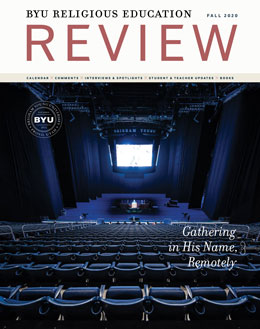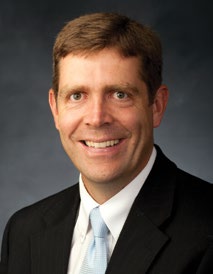Fall 2020 Review Magazine

Our Commitment: Being Different, Being Better
Message from the Deans’ Office
J. B. Haws, Associate Dean

Because of the realities of printing and production, this message is being written several weeks before it appears in print. And given all that we’re experiencing right now, it is difficult to predict what the world might be like by the time this Review magazine arrives in the hands of readers.
But as of mid-summer 2020, some things loom large—and demand our attention. In a 17 June 2020 address at BYU’s Religious Freedom Review, Elder David A. Bednar called this a time of “wake-up calls.” COVID-19 is affecting everyone in unprecedented ways—but we’re facing more than just a global pandemic. As Elder Bednar said, the world faces “a most pernicious social plague of racism.” It seems worthwhile for all of us to spend some contemplative moments in this wake-up call exercise.
How can we minister to individuals in a time of disconnectedness?
How can we address blind spots in our attitudes about racial justice? (It’s worth checking out a series of very short films created by BYU advertising students at checkyourblindspot.org.)
How can we each work to fight against that “most pernicious social plague of racism”?
How will we be different? How will Religious Education at BYU be different?
We join a chorus of voices expressing admiration for the faculty and students of BYU who, in an effort to slow the spread of COVID-19, transitioned to remote teaching and learning in only a matter of a few days in March. While acknowledging ongoing challenges, we nevertheless have to give high praise to the university community for making this work. Some of those efforts are highlighted in this edition of the magazine. But as we approach fall semester, we know more must be done to connect with and engage and support students effectively.
We also join a chorus of voices on our campus calling for us to take up the charge given by President Russell M. Nelson and leaders of the NAACP to “review processes, laws, and organizational attitudes regarding racism and root them out once and for all.” In all aspects of our work in Religious Education at BYU, we know more must be done—and we pledge to do it. We stand with the BYU Committee on Race, Equity, and Belonging in affirming that "rooting out racism, healing its wounds . . . is the responsibility of every member of the BYU community." We will do all we can—in our classrooms, in our curriculum, in our interactions—“to work tirelessly to build bridges of understanding” (President Nelson’s words).
As we start an academic year unlike any other, we, too, will be different than we have been before. That is our commitment.
J. B. Haws
Associate Dean, Religious Education